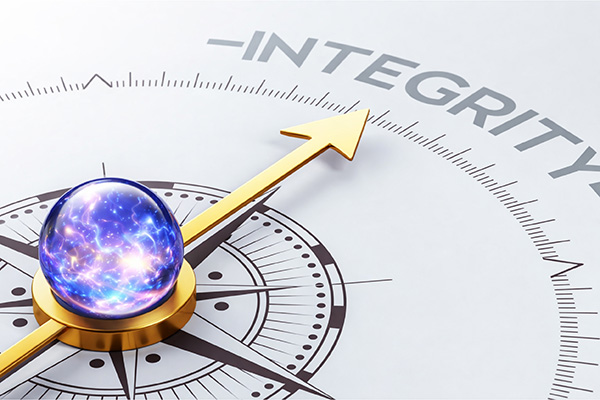spiritual virtue
Why Integrity Is Non-Negotiable In Psychic Reading
 I often come across psychic-related news stories that just baffle me as a spiritual person. They all have one thing in common: regular people who lose a lot of money, often in cryptocurrency scams, after trusting a fake psychic or fortune-teller.
I often come across psychic-related news stories that just baffle me as a spiritual person. They all have one thing in common: regular people who lose a lot of money, often in cryptocurrency scams, after trusting a fake psychic or fortune-teller.
In a bunch of cases recently, people were encouraged to invest in cryptocurrencies or other investment schemes over the course of weeks or months. Whenever they had any doubts, they were reassured and encouraged to keep investing.
But when they tried to withdraw their money, they found that it was all gone. The money was never invested, the platforms were fake, and the people they had trusted were no longer available.
These stories often end with victims feeling embarrassed and confused about how they got drawn so deeply into such a scam.
The so-called “psychic” usually operated under a fake name. They weren’t linked to any reputable platforms, and had no online presence or reputation to speak of. They usually disappear as soon as the authorities get involved.
What bothers me most about these stories is the lack of integrity and the misuse of trust. No ethical psychic practitioner is going to advise clients that way.
My first reaction is always: How can someone do this to another person? Then, I can’t help but also wonder: How could someone be so gullible and irresponsible to follow such questionable financial advice?
Ask Spirit For Patience This Holiday Season
The holidays are supposed to be a time of joy, togetherness, and celebration. But for some of us, it can also be a time of tension, distress, and intense emotions.
Instead of being a time of gratitude, love, and connection, for some of us the holidays mark the resurfacing of old family conflicts, unresolved tensions, and the weight of others’ overwhelming expectations or criticisms.
These challenges often lead to frustration, sadness, anger, or feelings of being overwhelmed, turning what should be a time of love and belonging into one that underscores where our relationships with loved ones are most strained.
At this point, asking spirit or your higher power to help you cultivate the virtue of patience becomes a powerful way to stay grounded and centered.
Patience isn’t just about enduring difficult moments; it’s about being aware of those moments and choosing to respond with grace and dignity rather than impulsively. When tensions rise — perhaps during a family dinner where conversations may become heated or awkward — it is easy to fall back on old patterns and habitual responses. Asking for spiritual support and protection in these moments, however, can provide a higher perspective and an empowered response.
Whether it’s through a silent prayer, a few deep breaths, whispering your favorite mantra, or simply making a conscious call for help in your mind, spiritual presence can help you pause, step back, ground and center, and approach the situation calmly and with more compassion — for yourself and others.
Always Keep An Open Mind In Psychic Readings
 In high school, I predicted that a friend of mine would lose something valuable and then have a car accident shortly thereafter.
In high school, I predicted that a friend of mine would lose something valuable and then have a car accident shortly thereafter.
I also warned him that the loss of something valuable would be an omen: a sign from the universe for him to be more careful and responsible.
He looked at me like I was crazy.
A few months later he lost his wallet because he had been careless. He later told me it reminded him of what I had said and it shook him up enough to start being more careful in his daily life. He even stopped his bad habit of never using his seat belt when driving.
Good thing he did. A few months later, he drove his car off a cliff! The police officer told him that he would have been killed if he had not been wearing his seat belt.
He brought up the story at our ten-year high school reunion and praised me as the person who saved his life. Of course, I did not mention the eye-rolling and “you’re crazy” look he gave me at the time. Besides, saying “I told you so” is not very dignified.
Not much has changed since high school. As a professional psychic, I still have to tell my clients things that makes them doubt our connection or my ability, and sometimes even my sanity! You learn to suck it up and deal with the raised eyebrows and side-eyes.
I understand how it feels for them, because I have had to keep an open mind as a psychic client, too. Many years ago, a medium told me that I would also work as a psychic one day. I thought this was really strange because I had been in the performing arts most of my life, and in my mind there was no way she could be right. But here I am today. Even psychics don’t always know where life is taking them.
Free Yourself From Karmic Debt
 One of the most important things we must do before we leave this life and embrace the next is to ensure that our karmic debts are completely resolved. By doing so, we leave this world unburdened and ready to embrace our next existence with complete bliss.
One of the most important things we must do before we leave this life and embrace the next is to ensure that our karmic debts are completely resolved. By doing so, we leave this world unburdened and ready to embrace our next existence with complete bliss.
Now, if the consequences you may suffer in the afterlife are not of much concern to you, and you feel that karma is not really your problem, you may want to reconsider.
Carrying the heavy burden of karmic debt can also cause considerable misery and struggle in our present daily lives, manifesting as recurring negative patterns and obstacles that hinder our progress and well-being.
Our unresolved karma often leads to dysfunctional relationships, financial difficulties, health problems, and emotional turmoil as past harmful actions generate corresponding negative consequences. An ongoing state of karmic debt fosters feelings of frustration, helplessness, and despair, making it difficult to achieve happiness, joy, fulfillment, and peace.
By carrying the weight of unresolved karmic debt, you may find yourself trapped in a cycle of suffering, unable to break free and achieve the positive, fulfilling life you desire.
Karmic debt is a concept rooted in the spiritual principle of karma, which is a fundamental belief in many Eastern philosophies and religions, especially Hinduism and Buddhism. Karma refers to the universal law of cause and effect, whereby every action has a corresponding reaction. Our poor choices and negative actions create a spiritual debt. By acknowledging this debt and resolving our past mistakes, we achieve a state of inner peace, higher consciousness, spiritual growth and enlightenment.
Spiritual Maturity Is A Lifelong Journey
 What does spiritual maturity mean to you? Every time I ask someone this question, I get all kinds of different answers.
What does spiritual maturity mean to you? Every time I ask someone this question, I get all kinds of different answers.
A Baby Boomer I asked said it meant going to church, donating to charities, studying the Bible, and following the Ten Commandments.
When I asked a Gen Z client, she said it meant minding your own business and not caring what others think of you because it is none of your business what they think. She also said she was a Wiccan and didn’t believe in wishing negative energy on others, because she knew it would only come back to her if she did.
I recently asked four people at a social gathering, and they had different opinions on the subject. They were in their 30s and 40s and had a young teenager with them. Interestingly, one thing they all agreed on was that it is spiritually mature to create healthy boundaries with family and friends for your own mental and spiritual well-being. One woman shared, for exxample, that if she hadn’t stopped hanging out with one of her friends, she would have hit rock bottom emotionally.
“I just could not put up with the way she treated me. I used to spend a lot of time stressing about the things she would say and do. I was always overthinking every toxic interaction with her, and our so-called friendship was not good for my mental state,” she explained. “So, for me, spiritual maturity is walking away from those who bring you down.”
The Spiritual Virtue Of Patience
 Patience is considered an essential virtue in most spiritual and religious traditions for several reasons. It is consistent with the core values and teachings of various spiritual paths and belief systems.
Patience is considered an essential virtue in most spiritual and religious traditions for several reasons. It is consistent with the core values and teachings of various spiritual paths and belief systems.
Many spiritual practices emphasize the importance of maintaining a state of inner calm in the midst of life’s challenges. Patience is fundamental to achieving inner peace and serenity. Patience helps us maintain a sense of serenity even in the face of extreme adversity.
Patience also enables us to surrender to the universal flow and accept the divine timing of outcomes for our highest good. We are better equipped to accept the divine plan and trust in the unfolding of events and circumstances as they are meant to be. Patience signifies our belief in a higher power and the universal order of all things.
Through patient introspection and self-reflection, we learn to understand our own thoughts, feelings, and behaviors, which leads to spiritual growth and self-improvement.
Impatience leads to negative emotions such as anger, frustration, and resentment. By practicing patience, we can better control and manage these emotions, which promotes emotional well-being and spiritual harmony.
Without patience, it is also difficult to develop understanding and empathy for others. Being patient with our own flaws and imperfections, as well as those of others, promotes the spiritual qualities of empathy and kindness.
